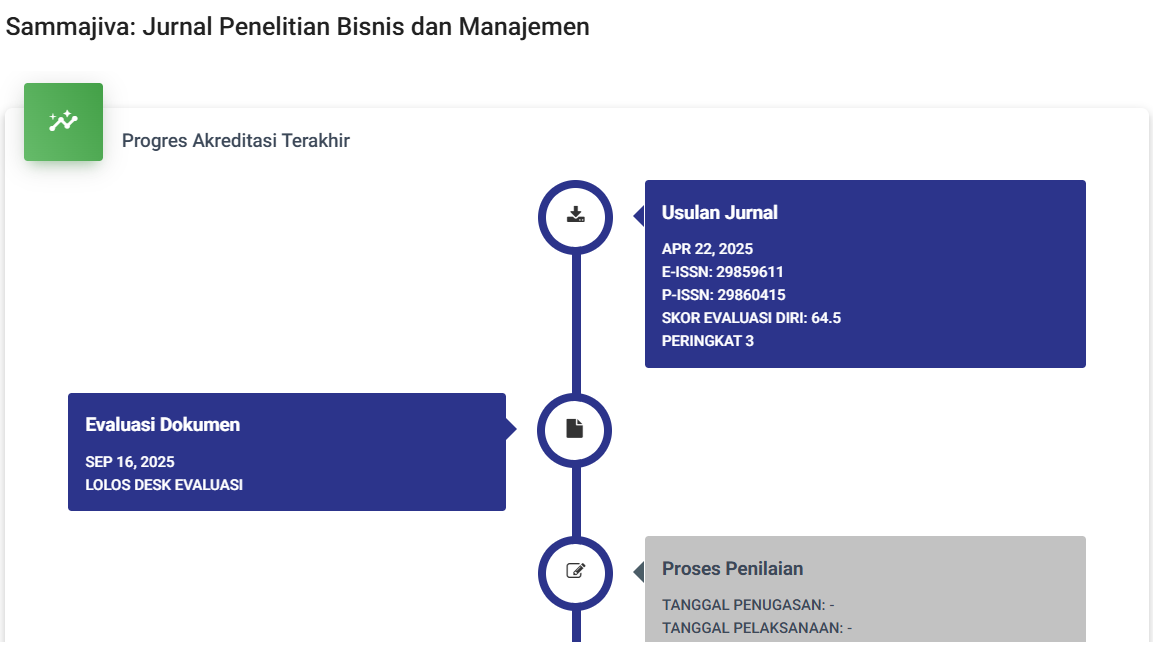Peran Perceived Organizational Support terhadap Work Engagement pada Karyawan Ekspatriat di PT. X
DOI:
https://doi.org/10.47861/sammajiva.v2i2.1234Keywords:
Perceived Organizational Support, Work Engagement, Expatriate Employees, Organizational SupportAbstract
This study aims to examine the influence of Perceived Organizational Support (POS) on work engagement among expatriate employees at PT.X. This research employs a quantitative approach with a correlational survey design, involving 40 expatriate employees working in various countries. The research instrument consists of a questionnaire comprising the POS scale and the Work Engagement scale. The correlation analysis results show a significant positive relationship between POS and work engagement, with a correlation coefficient of r = 0.62 (p < 0.01). Linear regression analysis indicates that POS significantly predicts work engagement, with a regression coefficient β = 0.57 (p < 0.01), and POS accounts for 38% of the variance in work engagement. These results suggest that perceived organizational support plays a crucial role in enhancing expatriate employees' work engagement. These findings also support social exchange theory, which posits that employees who feel supported by their organization are more likely to reciprocate with higher levels of commitment and engagement. The practical implication of this study is the importance for multinational companies like PT.X to develop and strengthen support programs for expatriate employees to enhance their engagement and performance.
References
Bakker, A. B., & Albrecht, S. (2018). Work engagement: Current trends. Career Development International, 23(1), 3-11. https://doi.org/10.1108/CDI-11-2017-0207
Bakker, A. B., & Demerouti, E. (2018). Multiple levels in job demands-resources theory: Implications for employee well-being and performance. In E. Diener, S. Oishi, & L. Tay (Eds.), Handbook of well-being (pp. 1-13). DEF Publishers. https://doi.org/10.1007/978-3-030-14523-0_16
Bakker, A. B., Demerouti, E., & Sanz-Vergel, A. I. (2023). Job demands-resources theory: Ten years later. Annual Review of Organizational Psychology and Organizational Behavior, 10(1), 97-121. https://doi.org/10.1146/annurev-orgpsych-120120-013039
Chew, J., & Debowski, S. (2021). The role of perceived organizational support in the adaptation of expatriates. International Journal of Intercultural Relations, 70, 1-10. https://doi.org/10.1016/j.ijintrel.2019.05.004
Creswell, J. W., & Creswell, J. D. (2018). Research design: Qualitative, quantitative, and mixed methods approaches (5th ed.). Sage publications.
Eisenberger, R., & Stinglhamber, F. (2019). Perceived organizational support: Fostering enthusiastic and productive employees. American Psychological Association. https://doi.org/10.1037/0000133-000
Etikan, I. (2017). Sampling and sampling methods. Biometrics & Biostatistics International Journal, 5(6), 00149. https://doi.org/10.15406/bbij.2017.05.00149
Giauque, D., Anderfuhren-Biget, S., & Varone, F. (2022). Stress and turnover intentions in the public sector: The mediating role of organizational commitment. International Journal of Public Administration, 45(1), 53-65. https://doi.org/10.1080/01900692.2020.1839491
Gillet, N., Fouquereau, E., Coillot, H., & Bonnaud-Antignac, A. (2018). The effects of organizational factors on psychological needs and their relations with well-being. Journal of Organizational Behavior, 39(1), 1-17. https://doi.org/10.1002/job.2209
Harzing, A. W., & Pudelko, M. (2018). The internationalization of business: A review of the literature and the implications for organizational behavior. Routledge. https://doi.org/10.4324/9781351262804
Kraimer, M. L., Bolino, M. C., & Mead, B. A. (2018). The influence of expatriate and repatriate experiences on career success. Journal of World Business, 53(1), 124-134. https://doi.org/10.1016/j.jwb.2017.08.010
Kurtessis, J. N., Eisenberger, R., Ford, M. T., Buffardi, L. C., Stewart, K. A., & Adis, C. S. (2017). Perceived organizational support: A meta-analytic evaluation of organizational support theory. Journal of Management, 43(6), 1854-1884. https://doi.org/10.1177/0149206315575554
Liu, Y., & Ipe, M. (2020). The impact of perceived organizational support on work engagement: A study of expatriates in China. International Journal of Human Resource Management, 31(7), 945-964. https://doi.org/10.1080/09585192.2017.1380069
Rhoades, L., & Eisenberger, R. (2020). Perceived organizational support: Review and a model of employee-organization relationships. Journal of Applied Psychology, 108(4), 689-708. https://doi.org/10.1037/apl0000741
Saks, A. M. (2019). Antecedents and consequences of employee engagement revisited. Journal of Organizational Effectiveness: People and Performance, 6(1), 19-38. https://doi.org/10.1108/JOEPP-06-2018-0034
Schaufeli, W. B. (2021). Work engagement: A key concept in occupational health psychology. Psychology Press. https://doi.org/10.4324/9781315601337
Shaffer, M. A., Harrison, D. A., & Gilley, K. M. (2016). Dimensions, determinants, and differences in the expatriate adjustment process. Journal of International Business Studies, 37(3), 345-372. https://doi.org/10.1057/palgrave.jibs.8400194
Slovin, E. (1960). Sampling. Survey Sampling.
Tavakol, M., & Dennick, R. (2011). Making sense of Cronbach's alpha. International Journal of Medical Education, 2, 53-55. https://doi.org/10.5116/ijme.4dfb.8dfd
Xanthopoulou, D., Bakker, A. B., & Demerouti, E. (2021). Work engagement and financial returns: A diary study on the role of job and personal resources. Journal of Occupational and Organizational Psychology, 94(3), 495-520. https://doi.org/10.1111/joop.12351








